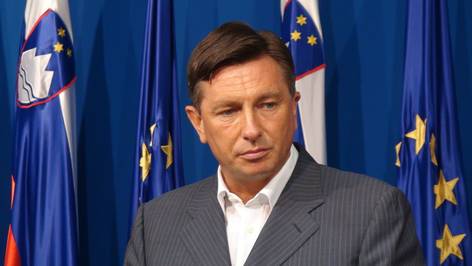NEWS
Press conference following the Government's 141st session
At today's 141st regular session, the Government of the Republic of Slovenia adopted a number of resolutions and decided to provide assistance to Adria Airways. The Government took note of the public sector salary system analysis and gave the government negotiating team the mandate to negotiate an elimination of the weaknesses of this system with the representative public sector trade unions. The two competent ministers, Mr Vlačič and Mrs Krebs, presented the most important issues in these resolutions and Prime Minister Pahor outlined the Government's positions for the European Council meeting in the evening. By way of conclusion the Prime Minister answered some topical questions.
At today's session, the Government was briefed on the financial status of Adria Airways and the plan for the financial restructuring of the company adopted by its board of directors. On the basis of the third paragraph of Article 11 of the Act Amending the Act on Corporate Governance of State Capital Investments of the Republic of Slovenia, the Government decided that the Capital Assets Management Agency would contribute EUR 49.5 million to the equity of Adria Airways, d. d., and the joint stock company, Posebna družba za podjetniško svetovanje (PDP, d. d.), would pay EUR 500 000, if the Agency provided a suitable source in the national budget in line with the plan for the financial restructuring and if 50 per cent of the banks' claims against the company were transformed into the company's equity. With its active engagement in this process, the Republic of Slovenia would also in the future like to meet its interests in the field of scheduled air services provided by a carrier with the seat in Slovenia.
The analysis of the effects and weaknesses of the public sector salary system was presented to the Government and the government negotiating team was given a mandate to negotiate an elimination of the weaknesses in the system with the representative public sector trade unions. These weaknesses include the systemic regulation of salaries in the Public Sector Salary System Act, the Public Sector Collective Agreement and the implementing regulations as well as anomalies stemming from discrepancies in valuations of individual posts or titles. In the light of the exacerbated macroeconomic and fiscal situation, the Government adopted the resolution that the elimination of these weaknesses must not result in an increase of the public sector salary bill. The list of weaknesses or anomalies in the existing salary system to be sent to the representative public sector trade unions is an important step in the implementation of the agreement reached between the Government and the representative public sector trade unions on measures in the field of salaries in 2011 and 2012. The agreement also envisages that the legal bases for the elimination of weaknesses in the public sector salary system will be prepared by the end of this year.
In his introduction the Prime Minster said that, on his proposal, the Government today adopted the decision to start discussions with the allies on the withdrawal of the Slovenian Armed Forces from Afghanistan once the tasks entrusted to our troops by the UN are accomplished. This will also be discussed by the Defence and Foreign Policy Committees in the National Assembly and the Prime Minister relies on the deputies to endorse the decision.
Prime Minister Pahor also touched upon the forthcoming European Council meeting in Brussels expressing his pleasure over the anticipated European Council statement on the conclusion of negotiations between the European Commission and the Republic of Croatia by the end of this month. He also took the opportunity to congratulate Croatia on these crucial developments. The Prime Minister continued by expressing concern about the Euro Pact and added that Slovenia was not at any great risk in this respect. Nevertheless, he will have to notify the European Council of the negative outcome of the referendum on the pension reform and explain that the Slovenian Government will continue negotiations with the social partners in order to facilitate the implementation of the reform processes under a new government. A budget revision, as a consequence, will focus on austerity measures which will address our major concern if adopted by the National Assembly. He also commented on the issue of Greece where the Greek parliament is discussing the adoption of reform measures to tackle the crisis. Should the parliament vote against, Greece will find itself in great difficulties that will spill over to the Eurogroup which, in turn, will have to respond quickly and wisely. This issue is on the agenda of the meeting in Brussels.
The Prime Minister then answered some questions from the press; for the audio recording of the press conference see: www.vlada.si.




